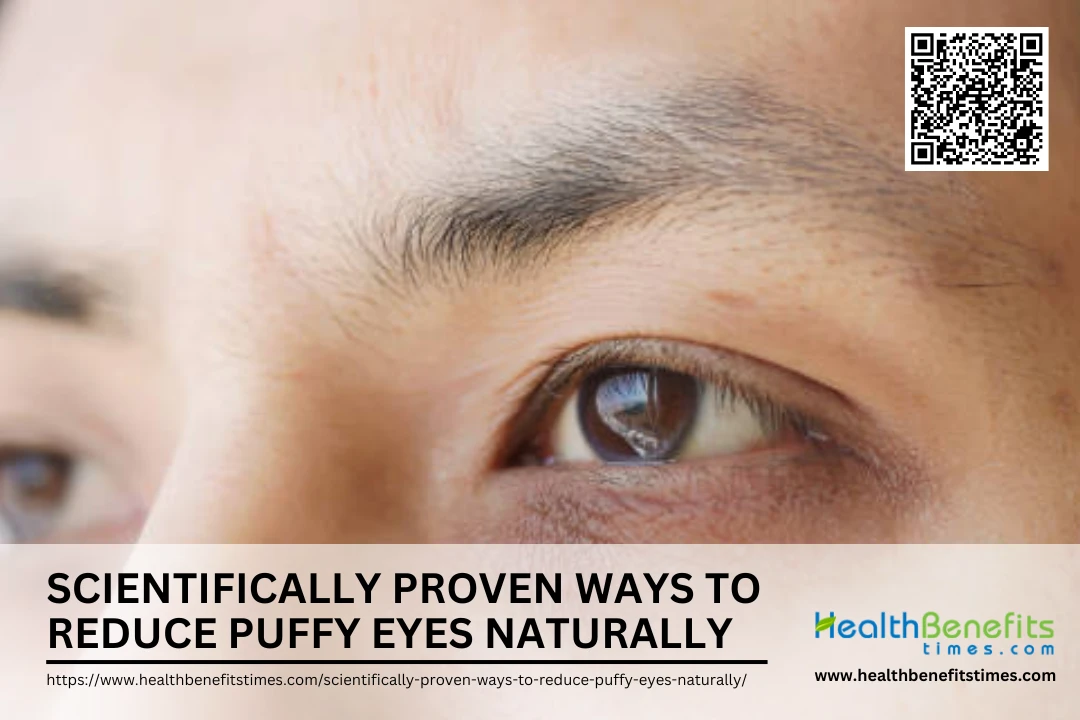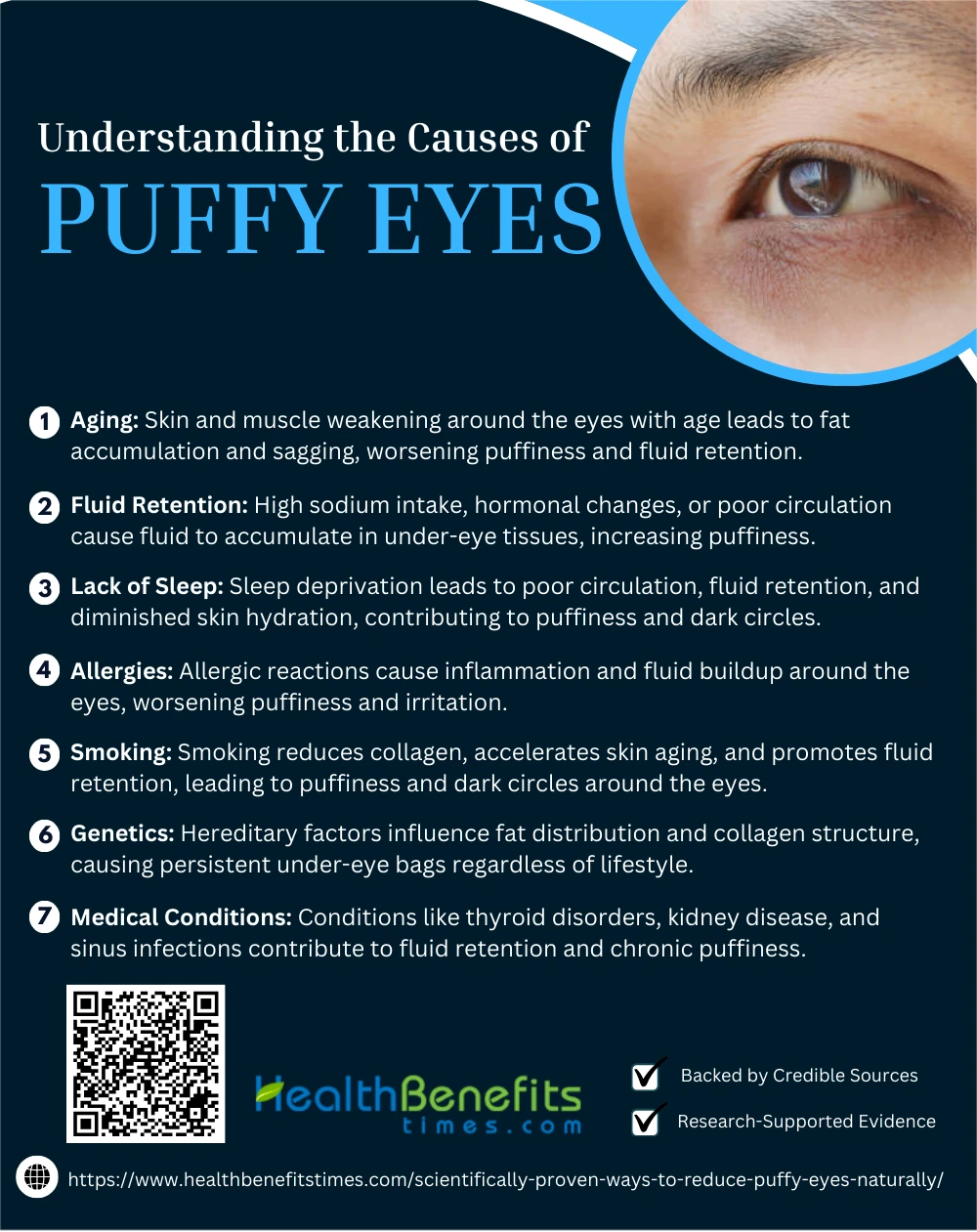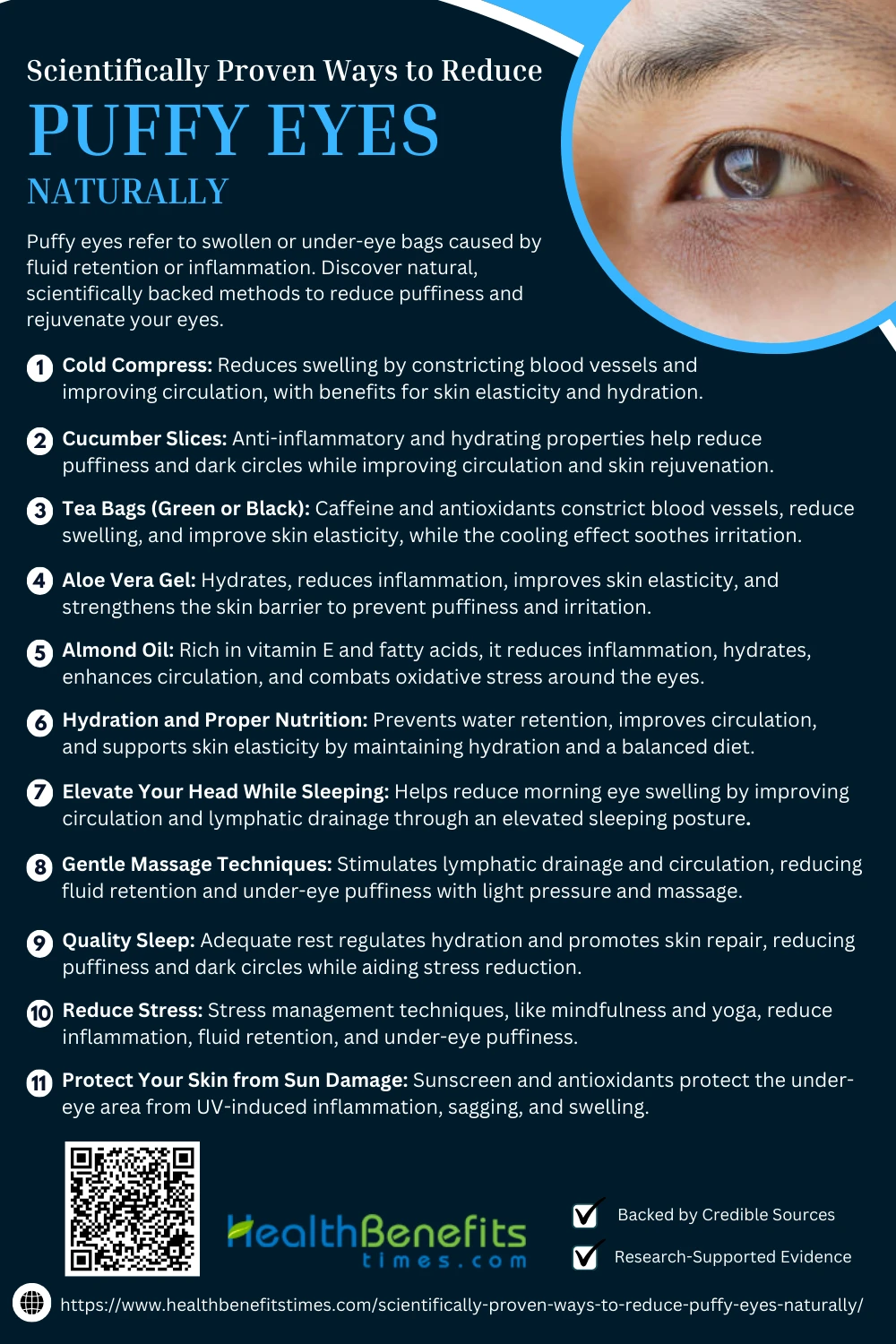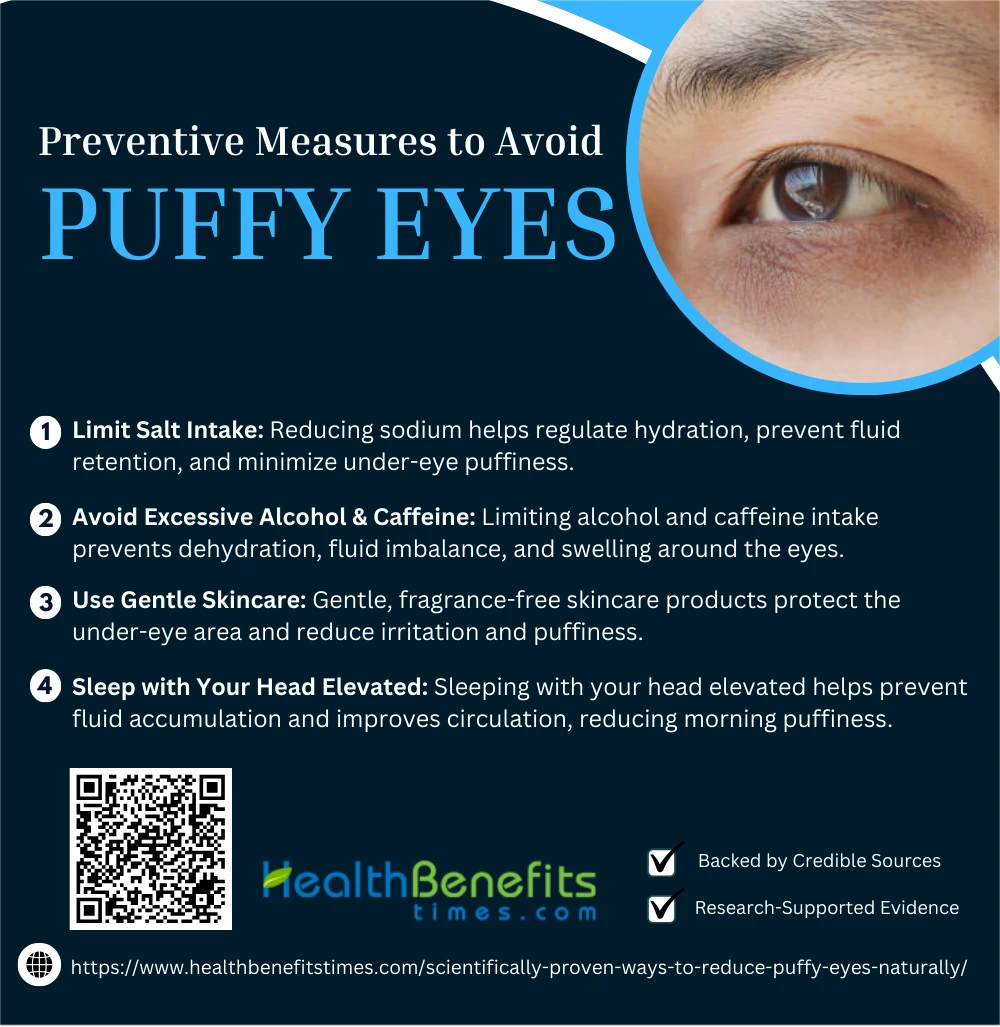- Puffy eyes refer to swollen or under-eye bags caused by fluid retention or inflammation.
- Discover natural, scientifically backed methods to reduce puffiness and rejuvenate your eyes.
- Simple lifestyle changes and home remedies can significantly improve the appearance of tired, puffy eyes.
 Puffy eyes, often characterized by swelling and a tired appearance around the eyes, occur when excess fluid accumulates in the tissues surrounding the eyes, typically due to factors like poor sleep, allergies, or fluid retention. These conditions can cause discomfort and detract from a person’s overall appearance.To combat puffy eyes naturally, there are several scientifically supported remedies. One of the most common and effective methods is using cold compresses, which can help reduce swelling and constrict blood vessels, providing relief from puffiness. Additionally, certain anti-inflammatory ingredients, such as caffeine, have been shown to reduce puffiness by stimulating circulation and constricting blood vessels in the under-eye area. Incorporating a healthy diet rich in antioxidants, like vitamin C, can also support the skin’s elasticity and minimize the appearance of puffiness.
Puffy eyes, often characterized by swelling and a tired appearance around the eyes, occur when excess fluid accumulates in the tissues surrounding the eyes, typically due to factors like poor sleep, allergies, or fluid retention. These conditions can cause discomfort and detract from a person’s overall appearance.To combat puffy eyes naturally, there are several scientifically supported remedies. One of the most common and effective methods is using cold compresses, which can help reduce swelling and constrict blood vessels, providing relief from puffiness. Additionally, certain anti-inflammatory ingredients, such as caffeine, have been shown to reduce puffiness by stimulating circulation and constricting blood vessels in the under-eye area. Incorporating a healthy diet rich in antioxidants, like vitamin C, can also support the skin’s elasticity and minimize the appearance of puffiness.
Understanding the Causes of Puffy Eyes
Here are the main causes of puffy eyes, explained in a listicle format:
1. Aging
Aging is a major cause of puffy eyes due to the weakening of skin and muscle tissues around the eyes, leading to fat accumulation and sagging. Studies indicate that age-related structural changes in the lower eyelid contribute to persistent puffiness. (1) Additionally, loss of skin elasticity exacerbates fluid retention, increasing swelling over time. (2)
2. Fluid Retention
Fluid retention can significantly contribute to puffy eyes, often resulting from high sodium intake, hormonal fluctuations, or poor circulation. (3) Research suggests that excess fluid accumulates in the delicate under-eye tissues, worsening puffiness and dark circles, particularly in individuals with a high-salt diet or dehydration. (4)
3. Lack of Sleep
Lack of sleep leads to poor circulation and fluid retention around the eyes, resulting in noticeable puffiness and dark circles. (3) Studies show that sleep deprivation disrupts skin hydration and elasticity, further contributing to periorbital swelling. (5)
4. Allergies
Allergic reactions trigger inflammation and histamine release, causing swelling and fluid buildup in the delicate eye area [source]. (6) Research suggests that allergens like pollen and dust exacerbate periorbital edema, leading to persistent puffiness and irritation [source]. (7)
5. Smoking
Smoking accelerates skin aging and reduces collagen production, leading to sagging and fluid retention around the eyes, causing puffiness. (8) Research also suggests that smoking worsens under-eye dark circles and dryness, further exacerbating periorbital swelling. (3)
6. Genetics
Genetics plays a crucial role in puffy eyes, influencing fat distribution and collagen structure, leading to hereditary under-eye bags. (2) Studies indicate that individuals with a family history of periorbital puffiness are more likely to experience persistent swelling regardless of lifestyle factors. (2)
7. Medical Conditions
Underlying medical conditions such as thyroid disorders, kidney disease, and sinus infections can lead to fluid retention and persistent puffy eyes. (3) Research indicates that chronic inflammation and circulatory issues also contribute to periorbital swelling, exacerbating puffiness over time. (5)
Scientifically Proven Natural Remedies to Reduce Puffy Eyes
Struggling with puffy eyes? Discover scientifically proven natural remedies that reduce swelling, improve circulation, and restore a refreshed look. These evidence-based solutions offer gentle, effective relief without harsh chemicals or expensive treatments.
1. Cold Compress
Cold compress therapy effectively reduces puffy eyes by constricting blood vessels and minimizing fluid retention. (9) Studies show that applying a cold compress helps decrease inflammation, improving under-eye appearance. (10) Research highlights its role in reducing skin swelling and enhancing circulation. (11) Moreover, regular cold therapy supports skin elasticity and hydration, preventing future puffiness. (12) Its effectiveness is also recognized in dermatological treatments for periorbital swelling. (5)
2. Cucumber Slices
Cucumber slices are scientifically proven to reduce puffy eyes due to their anti-inflammatory and hydrating properties. (13) Research shows that cucumber’s cooling effect constricts blood vessels, decreasing swelling. (3) Studies indicate that its antioxidants and vitamin C help rejuvenate under-eye skin. (14) Additionally, its natural hydration restores skin elasticity and soothes tired eyes. (15) The compounds in cucumber also improve circulation, reducing dark circles and puffiness. (16)
3. Tea Bags (Green or Black)
Tea bags, especially green or black tea, effectively reduce puffy eyes due to their caffeine and antioxidant content, which constricts blood vessels and reduces swelling. Studies suggest that tannins in tea reduce fluid retention, alleviating under-eye puffiness. The cooling effect of refrigerated tea bags enhances decongestion and soothes irritation. (17) Research also indicates that polyphenols in tea improve skin elasticity and hydration. Additionally, the anti-inflammatory properties of tea help combat dark circles and puffiness.
4. Aloe Vera Gel
Aloe vera gel is scientifically proven to reduce puffy eyes by hydrating the skin and reducing inflammation. (18) Studies highlight that aloe vera’s cooling effect soothes the under-eye area, reducing swelling. (19) Its antioxidant properties also help improve skin elasticity and repair damaged cells. (20) Research suggests that aloe vera gel strengthens the skin barrier, preventing moisture loss and enhancing firmness. (21) Furthermore, its anti-inflammatory effects make it a powerful remedy for periorbital puffiness and irritation. (22)
5. Almond Oil
Almond oil is a powerful natural remedy for puffy eyes, rich in vitamin E and fatty acids that help reduce inflammation and dark circles. (23) Studies indicate that almond oil deeply hydrates the skin, improving elasticity and reducing fluid retention under the eyes. (24) Research highlights its ability to soothe irritated skin and enhance blood circulation, preventing puffiness [source]. The antioxidant properties of almond oil combat oxidative stress, protecting delicate under-eye skin. (25) Additionally, its emollient properties help strengthen the skin barrier, reducing signs of fatigue [source].
6. Hydration and Proper Nutrition
Proper hydration and nutrition play a crucial role in reducing puffy eyes by preventing water retention and improving circulation. (26) Studies suggest that consuming adequate water intake maintains skin elasticity and flushes out excess sodium, reducing swelling. (27) Nutrient-rich foods like vitamin C and omega-3 fatty acids support collagen production and minimize inflammation. (28) Research indicates that avoiding processed foods and high-sodium diets helps prevent fluid accumulation around the eyes. (29)
7. Elevate Your Head While Sleeping
Elevating your head while sleeping helps prevent fluid accumulation around the eyes, reducing puffiness effectively. (30) Studies show that a slight incline in sleeping posture enhances lymphatic drainage, reducing morning eye swelling. (31) Research also suggests that elevated sleeping positions improve circulation, preventing fluid buildup under the eyes. (32) Experts recommend using an extra pillow or adjustable bed to achieve optimal results. (33) Additionally, proper sleeping posture supports skin elasticity, reducing long-term puffiness. (34)
8. Gentle Massage Techniques
Gentle massage techniques stimulate lymphatic drainage, reducing fluid retention and under-eye puffiness. (3) Studies show that circular massaging motions help break down fluid buildup, minimizing swelling. (35) Research highlights that using light pressure with fingertips or jade rollers improves blood circulation and skin elasticity. Regular massage therapy also helps relax eye muscles, reducing stress-related swelling.
9. Quality Sleep
Quality sleep is essential for reducing under-eye puffiness, as inadequate rest can cause fluid retention and inflammation. Studies show that proper sleep helps regulate hydration levels, preventing eye swelling. (36) Research indicates that deep sleep promotes skin repair, reducing dark circles and puffiness. Natural remedies like herbal teas can improve sleep quality, enhancing skin appearance. A well-balanced sleep cycle aids in stress reduction, further preventing eye bags. (14)
10. Reduce Stress
Chronic stress can trigger inflammation and fluid retention around the eyes, leading to puffiness. Research highlights that stress management techniques, such as mindfulness and meditation, can significantly reduce eye swelling. (37) Herbal remedies like adaptogens help combat oxidative stress, improving skin resilience. (38) Adequate hydration and stress reduction techniques also minimize cortisol-related swelling. (39) Studies suggest that acupuncture and yoga can improve circulation, reducing under-eye puffiness. (39) Implementing relaxation techniques enhances sleep quality, further preventing eye bags. (39)
11. Protect Your Skin from Sun Damage
Shielding your skin from sun damage is essential in preventing under-eye puffiness, as UV exposure accelerates collagen breakdown, leading to sagging and swelling. Research shows that applying sunscreen prevents UV-induced inflammation, reducing eye bags. (40) Antioxidants like vitamin C and E protect skin cells from oxidative stress, minimizing puffiness. Wearing sunglasses helps reduce squinting, preventing premature wrinkles. Hydrating skincare products maintain skin elasticity, reducing fluid retention. Natural remedies such as aloe vera soothe sun-exposed skin, alleviating under-eye swelling.
Preventive Measures to Avoid Puffy Eyes
Puffy eyes can make you look tired and aged, but you can prevent them with simple lifestyle changes. Here are effective preventive measures to keep your eyes fresh, bright, and youthful.
1. Limit Salt Intake
Excessive salt intake causes fluid retention, leading to under-eye puffiness. Research suggests reducing sodium consumption helps regulate hydration levels and minimizes swelling. (14) Studies also show that a low-sodium diet prevents inflammation and improves skin elasticity, reducing eye puffiness. (4)
2. Avoid Excessive Alcohol & Caffeine
Alcohol and caffeine dehydrate the body, causing water retention and puffy eyes. Research highlights that excessive caffeine consumption disrupts fluid balance, worsening under-eye swelling [Amnuaikit et al., 2011]. (4) Additionally, limiting alcohol intake prevents inflammation and improves skin hydration, reducing puffiness [Goel, 2024]. (14)
3. Use Gentle Skincare
Harsh skincare products can irritate the under-eye area, leading to puffiness. Studies show that using mild, fragrance-free creams helps protect sensitive skin and reduce swelling [Bucay & Day, 2013]. (41) Ayurvedic skincare with natural ingredients also promotes skin health and prevents inflammation.
4. Sleep with Your Head Elevated
Sleeping with your head elevated reduces fluid accumulation around the eyes, minimizing puffiness. Research suggests that an inclined position prevents gravitational fluid retention, improving under-eye appearance. (31) Studies also indicate that sleeping posture affects circulation, which can help reduce morning eye swelling. (32)
When to Seek Medical Advice
Persistent or painful eye swelling may indicate an underlying health condition. Experts recommend seeking medical attention if puffiness is accompanied by redness, vision changes, or persistent discomfort. (7) Sudden or severe swelling could be a sign of an allergic reaction or infection, requiring prompt evaluation. (10)
Conclusion
Reducing puffy eyes naturally is possible with scientifically backed methods that promote healthy skin and circulation. By staying hydrated, getting enough sleep, reducing salt intake, and applying cold compresses, you can effectively minimize puffiness. Natural remedies like cucumber slices, green tea bags, and aloe vera also help soothe and tighten the skin. Additionally, managing allergies and practicing facial massages can enhance lymphatic drainage, reducing fluid retention around the eyes. Consistency is key—adopting these habits regularly will lead to noticeable improvements. With these proven strategies, you can achieve a refreshed, youthful appearance without relying on expensive treatments or products.





